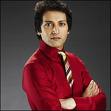Stop all the clocks, cut off the telephone. It’s Tuesday 8pm and the latest episode of Holby City is about to start on BBC1. (What’s that face for? Too lowbrow for you? Try it; you might like it. And it won a BAFTA two years ago.) Bear with me anyway because I’m using my favourite programme to talk about heroes in fiction.
-

- Michael Spence (Hari Dhillon)
Now where were we?

Ah yes, the thrill of the medical drama, watching characters under pressure in life and death situations.
– She’s in VF. Get the defibrillator. Clear!
– She’s not responding.
– Get her into theatre NOW!
I’ve no idea what it means to be in VF, or tachycardic, asystolic, etc. – that’s not important. What really matters is that this is an emergency situation and Consultant Michael Spence is ready to save the day.
I’ve always admired the way that TV scriptwriters get us to accept new characters in continuing drama. Take the aforementioned Mr Spence. I admit I didn’t like him at first – too shouty, his shirts were too tight, not to mention being a two-timing scumbag. But three months down the line and you start to reappraise the situation. Perhaps you were a bit harsh – no-one’s perfect, after all – and the shirts… are starting to look okay, actually. (Give yourself a few more episodes and you’ll be googling to find out whether your star signs are compatible and what he eats for breakfast.) Such is the magic of the scriptwriter that I’m left wondering, How the hell did you win me over!
It’s all about the competence
It’s simple really. According to James N. Frey in ‘How to Write Damn Good Fiction’ readers are intrigued by and attracted to characters that are good at what they do. Now, competence isn’t just about performing life-saving operations, or rescuing children from cliff-tops, or fighting off the enemy with stunning martial arts moves (thrilling though these things are). Character competence can be demonstrated in ordinary domains, at work or at play, through hobbies and interests. What matters, says Frey, is that if we are to like and care for a character we need to see them doing something well, even if their personal lives are disastrous.
So, who are your favourite fictional heroes? What are they good at?
Fiona Joseph


4 Comments
Hello Fi, great website. Alarmed to find that Mr Spence is my main competition. I thought it was that Griffin bloke?? Ha ha.
Speaking of heroes my nomination is the guy in The Road. The dad was pretty darn competent under extraordinary circumstances.
Hello you! Glad to see you’re getting the hang of this fiction stuff. We’ll make a reader of you yet! Only kidding. Yes, how could I forget the father in Cormac McCarthy’s brilliant (and bleak) book, ‘The Road’, a guy so competent that he even stitches up his own leg after he’s been attacked!! Who wouldn’t want him on your side when the world’s nearly come to an end?
What about some other examples though, perhaps of more ordinary kinds of competence?
Hi Fiona
I didn’t like Michael either when he first appeared.
But I don’t think writers can take all the credit for winning you (and me) around. The actors have a lot to do with it. And the sheer familiarity of having these people in your living room once a week for month after month – how can you not warm to someone you’ve invited into your home and shared so much trauma with?
But, mainly, I think it takes time for the actors and the writers to bed a character in.
The writing team will have spent a lot of time deciding who they want to invite onto the show. They’ll have discussed who’s there at the moment, who’s leaving, and what kind of person would bring something new to the cocktail of different character types. They’ll have carefully crafted exactly the right kind of character who can create the most interesting storylines when mixed in with all the other characters.
But then the casting team get to work. Working from the writers’ notes, they’ll look for an actor who exactly fits the bill. But quite often they don’t find exactly what they’re looking for. More often, they go looking for that person, but find someone else who’s FANTASTIC, but is the wrong ethnicity/age/height/sex! But this person is just so good how can we not ask them to join the cast? So, the writing team go back and look at their character profile and make some subtle, or not-so-subtle, adjustments.
And then the writers start writing episodes for the character. Because of the long lead times, they’ll often be doing this from the original character profiles from before the actor was cast. So, they’re writing for a character they’ve never seen, who’s about to change considerably once the casting decision is made.
And then the actor and director get hold of this material, and give it their own slant. The director discovers that this actor has an absolutely winning smile. So, out goes Mr Curmudgeon, and in comes Mr Smiley, still saying Mr Curmudgeon’s lines.
So, quite often you’ll see a grand opening scene introducing a new character. It will make some big statements about who this character is, what their backstory is, and what they’re doing in our drama. And then, five or six weeks in, the character gradually morphs into the one that the actor and the writers are more happy with. And, often, that’s the one that the audience end up loving too.
I think.
Hi Paul
Thank you for stopping by and giving us the inside story on how it all works in the world of BBC Continuing Drama. (You’re too modest to have mentioned here that you’ve written episodes of Eastenders and Casualty as well as Holby!)
It sounds as though you TV scriptwriters have to keep very flexible with your characters as there are SO many external variables coming into play – casting decisions, the actor’s own charisma, the directorial slant. In that respect I wonder if prose fiction writers have an easier time of it, although even we are at the mercy of our characters ‘taking over’ and going off in a slightly – or radically – different direction! I guess it’s all part of the magic and fun of writing.
Roll on 8pm tonight.
Fiona